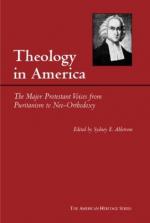|
This section contains 3,713 words (approx. 13 pages at 300 words per page) |

|
NEOORTHODOXY. Neoorthodoxy is the term used mainly in the English-speaking world to designate a theological movement within Protestantism that began after World War I as a reaction to liberal theology and broadened into diverse attempts to formulate afresh a theology of the Word of God grounded in the witness of holy scripture and informed by the great themes of the Protestant Reformation. Since its leaders had no interest in producing a new orthodoxy along the lines either of seventeenth-century Protestant scholasticism or of twentieth-century fundamentalism, the neoorthodox movement could more accurately be called neo-Reformation theology, but the former term has prevailed in common usage.
In its broadest sense neoorthodoxy is an umbrella term that includes a number of diverse but related theologies and theologians. Among them are dialectical theology, or "theology of crisis" in Switzerland and Germany (Karl Barth, Emil Brunner, Friedrich Gogarten, Rudolf Bultmann); motif research at...
|
This section contains 3,713 words (approx. 13 pages at 300 words per page) |

|


